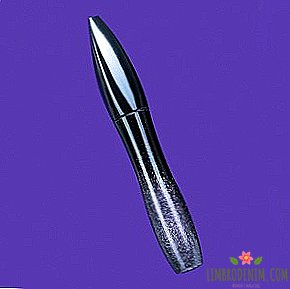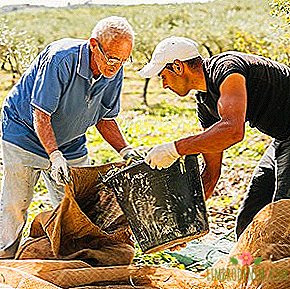How I Fought Hodgkin Lymphoma: From the first symptoms to remission
As a child I loved to lie with my mother in an embrace, buried in her ashy hair. I stroked her head and looked at the scar on my neck, wondering where he could have come from, made up incredible fairy tales, and my mother always agreed and admired my fantasy. As I got older, memories began to pop up in my head: my mother's exhausted body, the reluctance to stand up and appreciate my LEGO masterpiece, her nightly fevers, an abrupt change of hair. Years later, as is typical of adolescents, I asked a direct question and received a comprehensive answer: "Lymphoma." I was shocked, but at the same time I finally stopped tormenting myself with guesses. Since then, occasionally popping up news about patients with oncology I was very excited and insanely touched, because the disease was very close. I was very proud of my mother, but by tacit agreement, it was decided not to discuss it in the family and outside.

In the spring of 2015, I began to have nightmares about dead animals, larvae, hospital wards and operating rooms, falling teeth. At first I did not pay attention, but later, when the dreams became regular, I had an obsessive idea to go to the hospital for a full examination. I shared my thoughts with my relatives that the brain could send a signal about the disease in that way, but I was convinced that one should not be suspicious and invent nonsense. And I calmed down. In the summer, I fulfilled a long dream to cross America by car from the ocean to the ocean. My friends were delighted, and my impression was blurred by the feeling of wild fatigue, constant shortness of breath and pain in the chest. I blamed everything on laziness, heat, and the pounds I gained.
In October, I returned to sunny Moscow, and it would seem that I should be full of impressions and strength after a rest. But I just bent. At work it was unbearable, the fatigue was such that after a working day I only dreamed to be in bed more quickly. It was a torture to be in the subway: my head was spinning, it was constantly getting dark in my eyes, I fainted and earned a couple of scars on my temples. I was sick of odors, whether it be perfume, flowers or food. I pulled myself and scolded for the fact that I just can not get into the usual rhythm of life.
I spent one of those evenings with a friend whom I hadn’t seen for a long time: dinner, wine, jokes, memories and endless loops of conversation that made me stay overnight. The next morning, collecting my long hair before washing, I brushed my neck and noticed an orange-sized tumor. At the very same second, she put forward the exact assumption that it was, but remained surprisingly calm, and then pulled herself up with the words: "No, this can happen to anyone, but not to me." At breakfast, a friend noticed a tumor and suggested that it could be an allergy; I agreed, but memories began to flash in my head, pushing to the word "cancer."
On the way to work, I finally realized the seriousness of what was happening and realized that I should immediately go to the doctor. I remembered my mother's scar - exactly where my tumor was. Through a swarm of erratic thoughts, I heard a friend trying to cheer me up and joking absurdly, but this made me worse, and I felt a lump coming to my throat and tears were coming to my eyes.
A couple of hours later, without any emotion, I was sitting in a cold corridor on a bench in the district clinic. After some confusion, the therapist concluded: "You are most likely allergic - nothing to worry about, drink an antihistamine drug." I told about my mother's illness, suggested that it is worth doing an ultrasound, but in response the doctor said a phrase that put me in a stupor: "We have all directions on quotas, you look healthy - what ruddy cheeks are - I have no reason give it to you, go. " Later, I still many times faced with indifference, incompetence and negligence of doctors in public clinics.
Winter. Everything started spinning after I, without listening to anyone, nevertheless did a CT scan. The picture clearly showed conglomerates of huge lymph nodes in the neck and chest, enlarged heart and spleen. The radiologist sent me to an oncologist, and an oncologist to a hematologist. The latter praised me for perseverance and vigilance and confirmed my guesses, strongly advising me to cut out a part of the tumor for research (an exact diagnosis is made after biopsy and histological examination). After the operation, I heard the medical code "C 81.1", which means my illness. I had to overcome a lot in order to finally find out the correct diagnosis and begin the long-awaited treatment.
Hodgkin's lymphoma (also called lymphogranulomatosis) is an oncological disease. It is interesting that in the medical community it is not called cancer, since the cancer tumor is formed from epithelial tissue, and the blood cells and lymphoid tissue from which the lymphoma tumor is formed do not belong to them. But in their development, course and effects on the body lymphoma are aggressive, as well as cancer, and can affect other organs and systems other than immune. Therefore, if you do not delve into medical terms, they say that it is "cancer of the lymphatic system." It is easier to understand what is at stake and how serious the disease is. The exact cause of Hodgkin's lymphoma has not yet been identified, sometimes the disease is associated with Epstein-Barr virus. Lymphogranulomatosis is considered a disease of the young, as the first surge in incidence falls on 15-30 years. Currently, survival projections for early detection of the disease are quite positive. Maybe that's why I was sure from the very beginning that everything would work out for me, and maybe my mother's example helped.
It was important for me to understand what I have to go through. I asked to show me cut lymph nodes, explain the indicators of the tests and the mechanism of drug action
We immediately turned to my mother's doctor at the RCRC. Blokhin, but, unfortunately, by December the quotas for free treatment had already ended. Given the bureaucracy, new quotas would have appeared at the beginning of the next year, after the New Year holidays - that is, according to the best forecasts, in the twentieth of January. We could not wait - my condition worsened. I decided to be treated for a fee. The doctor and the clinic I found friends. Vadim Anatolievich Doronin, hematologist, director of the Scientific Society for Medical Innovations, became my leading doctor. From the very first minutes of the conversation, I understood: this is my doctor, I can trust my life to this person. He clearly set the tasks for me, outlined a treatment plan and said that he believed in me.
We agreed that we would act openly, as I wanted to know all the details and the whole truth about the prognosis and the course of treatment. Mom later said many times that she admired my courage, because she did not want to hear anything about the disease, she just wanted to be cured more quickly. But it was important for me to understand what will happen to my body, what I have to go through. So I could mentally prepare, make decisions independently and carefully, and it would be easier to transfer all the pain and side effects of the treatment. I asked an infinite number of questions, asked to show me the cut lymph nodes, explain what the test results mean, and describe the mechanism of action of chemotherapy drugs.
I was very lucky with all the doctors and medical staff: everyone was incredibly attentive, gave me confidence, joked and told stories. Chemotherapy was given every two weeks, and I completed all the courses in five months. A month later, I was given a control tomography, and after numerous consultations and consultations I decided to "finish off" the disease with radiation therapy. Chemotherapy is not something supernatural, as many imagine; these are simply droppers with potent chemotherapy drugs that kill cancer cells. Radiation therapy is a procedure in which a cancer tumor is targetedly killed with ionizing radiation.
I got into radiation therapy at the clinic of the Russian Medical Academy of Postgraduate Education, where Konstantin Andreevich Teterin and Elena Borisovna Kudryavtseva became my leading doctors. The radiologist and physicist greeted me every day with smiles, questioned about side effects, with trepidation put markup for radiation therapy and knocked out a quota for the best device. I could call my doctor at any time, get clear and effective advice. I understand that I am really lucky, if it is appropriate to speak in my situation. In urban institutions, people first wait for quotas, then raise money for the missing drugs and paid procedures, wait for the operation unbearably long, each time they slide down the wall in huge lines for chemotherapy, cannot receive urgent medical care for the strongest side effects, and sometimes even find out that the diagnosis is incorrect, and are treated again, according to a different scheme. The treatment takes years. I "shot out" pretty quickly - in a year.
I came to chemotherapy in the morning, gave a detailed blood test, and if the indicators were acceptable for chemotherapy (that is, my body could withstand it), I was hospitalized. The dropper itself is a relatively painless process. There are some tricks that all comprehend over time or learn from more experienced patients. For example, I have never eaten before hospitalization, as I was terribly nauseous, even despite anti-emetic and analgesic drugs that smooth out the toxic effect. There is a chemotherapy drug of red color, which among cancer patients is called differently - either “compote” or “sweet”. During its entry is worth drinking ice water to avoid stomatitis. It happens that it begins to burn the veins, this is a wildly unpleasant sensation - then it is worth slowing down the rate of the infuzomat. Many put ports to avoid burning veins, but my veins managed. Of course, they gradually disappeared, and by the last courses the hands were absolutely without veins: white-green, all bruised and burned. After the drip, you could stay for a couple of days under the supervision of doctors or go home. In a day, the most interesting began: vomiting, pain in the bones and internal organs, gastritis, stomatitis, insomnia, diathesis, allergies, worsening of blood formation, impaired heat transfer, and, of course, hair loss.
Drugs completely change the perception of the world. My hearing has worsened a thousand times, the taste perception of food has changed, the scent worked better than that of any dog - this greatly affects the nervous system. Most of the time between drug infusions is taken to combat side effects. I had to monitor blood since I had permanent leukopenia and thrombocytopenia. I did injections in the abdomen, stimulating the work of the bone marrow, in order to restore all the indicators before the next chemotherapy. On average, there were three or four normal days between injections of drugs, when I could move and serve myself without any help, watch a movie and read a book.
At this time, I was visited by friends and told about the outside world, which for me simply did not exist. Lack of immunity did not allow me to go out - it was life threatening. Gradually, the body gets used to chemotherapy, as well as to everything else. And I learned to spend time more productively, not paying attention to the side effects. But with addiction comes psychological fatigue. I expressed it in the fact that I was beginning to feel very sick for a couple of hours before being hospitalized, when I hadn’t done anything yet, but the body already knew in advance what was coming to it. This is very sad and exhausting.
There were fewer side effects from radiation therapy. I was promised vomiting, burns, fever, stomach and intestinal problems. But I had only a temperature and at the end a burn of the mucous membrane of the larynx and esophagus. From this I could not eat: every sip of water or the smallest piece of food felt like a cactus. I felt how he slowly and painfully descends into the stomach.
The most terrible moment was when we could not find the necessary preparations - they simply ended throughout Moscow. We collected the ampoules literally by the piece: one was given by the girl who completed the treatment, the remaining three were brought by classmates from Israel and Germany. A month later, the story repeated itself and out of despair, we took Russian generic drugs (analogues of foreign drugs) according to the compulsory medical insurance system - this turned into a four-day nightmare. I did not think that a person could experience such pain. I could not sleep, hallucinations and delirium began. Painkillers did not save, the ambulance made a helpless gesture.
Another blow was the conclusion of the control positron emission tomography (PET). The pictures revealed the process of destruction of the femur. A series of numerous checks, guesses, procedures, operations began. They said that it was an incompletely treated lymphoma, that initially I had the fourth stage, but this center of the disease was not noticed. Then they reported that it was an osteosarcoma (bone cancer) and prosthetics were needed. It was at this moment that I clearly understood the essence of the phrase "There is nothing more important than health" and realized that they were dying from lymphoma. In the end, the doctors reassured that this was neither one nor the other, and decided to observe. I still have not received a definite answer.
The constant stream of calls from friends made me repeat the same news an infinite number of times. I decided to create an instagram in which I would upload photos and news for my friends. The doctor supported this idea, because I had a lot of impressions, emotions and thoughts that I kept inside simply because I didn’t want my mother to get upset and nervous once again. Despite my positive and tenacity, I wanted to discuss pressing issues, ask exciting questions, or just chat and laugh at my position. Through tags and locations, I found people who fully understood me. Proper support is very important for a cancer patient: lisping and indiscriminate fading are terribly annoying, and neglect and indifference are depressing. I think that relatives and friends need to explain how to behave, so that a person going through such trials could remain a person: he did not slip into hysteria and aggression, but he didn’t get unstuck.
It is impossible to hush up, be afraid of the diagnosis and in every possible way to deny it. It is important to talk about it, to fight against ignorance and fear. With this we can save many
There is another extreme: I remember, sometimes I could not distinguish between the pain characteristic of chemotherapy, and those that are worth paying attention to, do not tolerate and immediately inform the doctor. I tolerated everything, and for this I was scolded by doctors. Such situations are dangerous - this, too, must be explained to the sick. Sometimes it is very difficult to soberly assess the situation and maintain a balance - for this you need to talk openly about the problem, communicate with people who have gone this way, and not be afraid to ask for advice or help. In our society, there are too many myths about oncology and labels that are hung on it. For example, some of my friends stopped communicating with me because they thought that I would infect them by airborne droplets or even psychosomatically. I can only smile at such statements.
I think everyone knows that during treatment a person's hair falls out and he can lose weight greatly, but more often, contrary to popular belief, many people gain weight because of the use of hormonal drugs during therapy. I lost some of my hair and recovered noticeably. I must say that I entered the small percentage of patients whose hair does not fall out at once and completely. At the end of the treatment, I looked like some kind of flabby biker from Louisiana: I had a huge bald spot on the top of my head, and I had long hair all around. My sister and I had a lot of fun. When I collected them in a bun, I could easily go to work and not surprise anyone with my appearance.
After enjoying the image, I shaved my head and felt a real delight. Words can not convey how I liked to be bald! In me the enthusiasm, impudence, improbable pride and self-confidence raged. I liked it when people stared at me, I was not afraid of questions and was not shy about myself. Of course, I had to face with conviction, and a couple of times with overt aggression. People could shout something after, threaten with a finger, push, make a remark. I could only feel sorry for them, because if I had been told about the diagnosis, they would most likely feel ashamed of them. There was a ridiculous case: I was going to radiation therapy, bald, in a dress, with markings on my chest, but on the contrary in a trolley bus there were two women of sixty years old. I listened to music, but at some point I accidentally heard an excerpt from their conversation: “Do not look at her, I saw such people - this is a Satanist! Look at the signs on her breast!” I laughed out loud - I could not help it.
For me, psychologically, the most difficult thing is not chemotherapy and radiation therapy, not operations and slanting eyes, but control tomography after treatment. Now I am in remission, but I will be completely healthy only in five years. There is the term "five-year survival" - this means that there is a likelihood of a relapse (return of the disease). It promises more complex and aggressive treatment, as well as bone marrow transplantation. All this is very difficult to transfer. Поэтому нужно быть осторожной: избегать солнца и стрессов, придерживаться диеты и следовать индивидуальным рекомендациям врача. Конечно, перед каждым контролем сердце замирает, и ты начинаешь прислушиваться к своему организму. Нужно перебороть этот страх и не впасть в паранойю. Страх - это нормально, но не нужно отдавать ему свою жизнь.
Помимо физических последствий лечения, которые могут вылезти в течение нескольких лет, есть и психологические. Порой бывает очень сложно влиться в обычный ритм. I think it is important to be able to pull yourself around and give yourself time. It will not be possible to immediately return to the usual pace - there is a danger of disrupting the still fragile organism. I find it difficult to accept it, because I love to live an active life. Sometimes in such cases, psychological rehabilitation is needed. For some reason, many believe that it is a shame. I think that it is necessary, but it can be different: it may be talking to a psychologist or just walking, traveling, sports, or any other hobby.
The most important thing: you can not hush up, be afraid of the diagnosis and in every possible way to deny it. It is important to talk about it, to fight against ignorance and fear. With this we can save many. Now I try, whenever possible, to help those who find me through social networks, as well as participate in charity events. For example, I'm friends with the girls from Cancer. Confession Control: we did photo shoots and a video channel, they suggested that I administer the project chat. I would like to do more and bring more people to it, since those who are faced with the diagnosis are much more than is commonly thought, and they all are waiting for support.
Photo: personal archive





